Best Picture
“American Sniper”
“Birdman
“Boyhood”
“The Grand Budapest Hotel”
“The Imitation Game”
“Selma”
“The Theory of Everything”
“Whiplash”
Actor
Steve Carell in “Foxcatcher”
Bradley Cooper in “American Sniper”
Benedict Cumberbatch in “The Imitation Game”
Michael Keaton in “Birdman or (The Unexpected Virtue of Ignorance)”
Eddie Redmayne in “The Theory of Everything”
Supporting Actor
Robert Duvall in “The Judge”
Ethan Hawke in “Boyhood”
Edward Norton in “Birdman
Mark Ruffalo in “Foxcatcher”
J.K. Simmons in “Whiplash”
Actress
Marion Cotillard in “Two Days, One Night”
Felicity Jones in “The Theory of Everything”
Julianne Moore in “Still Alice”
Rosamund Pike in “Gone Girl”
Reese Witherspoon in “Wild”
Supporting Actress
Patricia Arquette in “Boyhood”
Laura Dern in “Wild”
Keira Knightley in “The Imitation Game”
Emma Stone in “Birdman
Meryl Streep in “Into the Woods”
Animated Feature
“Big Hero 6” Don Hall, Chris Williams and Roy Conli
“The Boxtrolls” Anthony Stacchi, Graham Annable and Travis Knight
“How to Train Your Dragon 2” Dean DeBlois and Bonnie Arnold
“Song of the Sea” Tomm Moore and Paul Young
“The Tale of the Princess Kaguya” Isao Takahata and Yoshiaki Nishimura
Adapted Screenplay
“American Sniper” Written by Jason Hall
“The Imitation Game” Written by Graham Moore
“Inherent Vice” Written for the screen by Paul Thomas Anderson
“The Theory of Everything” Screenplay by Anthony McCarten
“Whiplash” Written by Damien Chazelle
Original Screenplay
“Birdman Written by Alejandro G. Iñárritu, Nicolás Giacobone, Alexander Dinelaris, Jr. & Armando Bo
“Boyhood” Written by Richard Linklater
“Foxcatcher” Written by E. Max Frye and Dan Futterman
“The Grand Budapest Hotel” Screenplay by Wes Anderson; Story by Wes Anderson & Hugo Guinness
“Nightcrawler” Written by Dan Gilroy
Cinematography
“Birdman Emmanuel Lubezki
“The Grand Budapest Hotel” Robert Yeoman
“Ida” Lukasz Zal and Ryszard Lenczewski
“Mr. Turner” Dick Pope
“Unbroken” Roger Deakins
Costume Design
“The Grand Budapest Hotel” Milena Canonero
“Inherent Vice” Mark Bridges
“Into the Woods” Colleen Atwood
“Maleficent” Anna B. Sheppard and Jane Clive
“Mr. Turner” Jacqueline Durran
Director
“Birdman Alejandro G. Iñárritu
“Boyhood” Richard Linklater
“Foxcatcher” Bennett Miller
“The Grand Budapest Hotel” Wes Anderson
“The Imitation Game” Morten Tyldum
Documentary Feature
“CitizenFour” Laura Poitras, Mathilde Bonnefoy and Dirk Wilutzky
“Finding Vivian Maier” John Maloof and Charlie Siskel
“Last Days in Vietnam” Rory Kennedy and Keven McAlester
“The Salt of the Earth” Wim Wenders, Juliano Ribeiro Salgado and David Rosier
“Virunga” Orlando von Einsiedel and Joanna Natasegara
Documentary Short Subject
“Crisis Hotline: Veterans Press 1” Ellen Goosenberg Kent and Dana Perry
“Joanna” Aneta Kopacz
“Our Curse” Tomasz Sliwinski and Maciej Slesicki
“The Reaper (La Parka)” Gabriel Serra Arguello
“White Earth” J. Christian Jensen
Film Editing
“American Sniper” Joel Cox and Gary D. Roach
“Boyhood” Sandra Adair
“The Grand Budapest Hotel” Barney Pilling
“The Imitation Game” William Goldenberg
“Whiplash” Tom Cross
Foreign Language Film
“Ida” Poland
“Leviathan” Russia
“Tangerines” Estonia
“Timbuktu” Mauritania
“Wild Tales” Argentina
Makeup and Hairstyling
“Foxcatcher” Bill Corso and Dennis Liddiard
“The Grand Budapest Hotel” Frances Hannon and Mark Coulier
“Guardians of the Galaxy” Elizabeth Yianni-Georgiou and David White
Original Score
“The Grand Budapest Hotel” Alexandre Desplat
“The Imitation Game” Alexandre Desplat
“Interstellar” Hans Zimmer
“Mr. Turner” Gary Yershon
“The Theory of Everything” Jóhann Jóhannsson
Original Song
“Everything Is Awesome” from “The Lego Movie”
Music and Lyric by Shawn Patterson
“Glory” from “Selma”
Music and Lyric by John Stephens and Lonnie Lynn
“Grateful” from “Beyond the Lights”
Music and Lyric by Diane Warren
“I’m Not Gonna Miss You” from “Glen Campbell…I’ll Be Me”
Music and Lyric by Glen Campbell and Julian Raymond
“Lost Stars” from “Begin Again”
Music and Lyric by Gregg Alexander and Danielle Brisebois
Production Design
“The Grand Budapest Hotel” Production Design: Adam Stockhausen; Set Decoration: Anna Pinnock
“The Imitation Game” Production Design: Maria Djurkovic; Set Decoration: Tatiana Macdonald
“Interstellar” Production Design: Nathan Crowley; Set Decoration: Gary Fettis
“Into the Woods” Production Design: Dennis Gassner; Set Decoration: Anna Pinnock
“Mr. Turner” Production Design: Suzie Davies; Set Decoration: Charlotte Watts
Animated Short Film
“The Bigger Picture” Daisy Jacobs and Christopher Hees
“The Dam Keeper” Robert Kondo and Dice Tsutsumi
“Feast” Patrick Osborne and Kristina Reed
“Me and My Moulton” Torill Kove
“A Single Life” Joris Oprins
Live Action Short Film
“Aya” Oded Binnun and Mihal Brezis
“Boogaloo and Graham” Michael Lennox and Ronan Blaney
“Butter Lamp (La Lampe Au Beurre De Yak)” Hu Wei and Julien Féret
“Parvaneh” Talkhon Hamzavi and Stefan Eichenberger
“The Phone Call” Mat Kirkby and James Lucas
Sound Editing
“American Sniper” Alan Robert Murray and Bub Asman
“Birdman Martín Hernández and Aaron Glascock
“The Hobbit: The Battle of the Five Armies” Brent Burge and Jason Canovas
“Interstellar” Richard King
“Unbroken” Becky Sullivan and Andrew DeCristofaro
Sound Mixing
“American Sniper” John Reitz, Gregg Rudloff and Walt Martin
“Birdman Jon Taylor, Frank A. Montaño and Thomas Varga
“Interstellar” Gary A. Rizzo, Gregg Landaker and Mark Weingarten
“Unbroken” Jon Taylor, Frank A. Montaño and David Lee
“Whiplash” Craig Mann, Ben Wilkins and Thomas Curley
Visual Effects
“Captain America: The Winter Soldier” Dan DeLeeuw, Russell Earl, Bryan Grill and Dan Sudick
“Dawn of the Planet of the Apes” Joe Letteri, Dan Lemmon, Daniel Barrett and Erik Winquist
“Guardians of the Galaxy” Stephane Ceretti, Nicolas Aithadi, Jonathan Fawkner and Paul Corbould
“Interstellar” Paul Franklin, Andrew Lockley, Ian Hunter and Scott Fisher
“X-Men: Days of Future Past” Richard Stammers, Lou Pecora, Tim Crosbie and Cameron Waldbauer

TV
Did JD from Scrubs Have a Dark Past?

TW: Discussions of child abuse and neglect.
The sitcom Scrubs ran from 2001- 2010 delighting viewers with the escapades of daydreaming Dr ‘JD’ Dorian and his friends. Unlike most TV sitcoms Scrubs perfectly balanced the comedic and the tragic. Being set in a teaching hospital with most of the main cast being doctors; there was plenty of fodder for some truly heart-wrenching storylines.
Like with most sitcoms, if you look under the jolly veneer (and have too much time on your hands) a much darker story emerges. In Scrubs, I would argue, this may be the past of its titular protagonist JD (played by Zach Braff). Some fans (ok, me) speculate that not only did JD have a less than ideal childhood but an abusive one.
Hints of this could be interpretated throughout the series:-
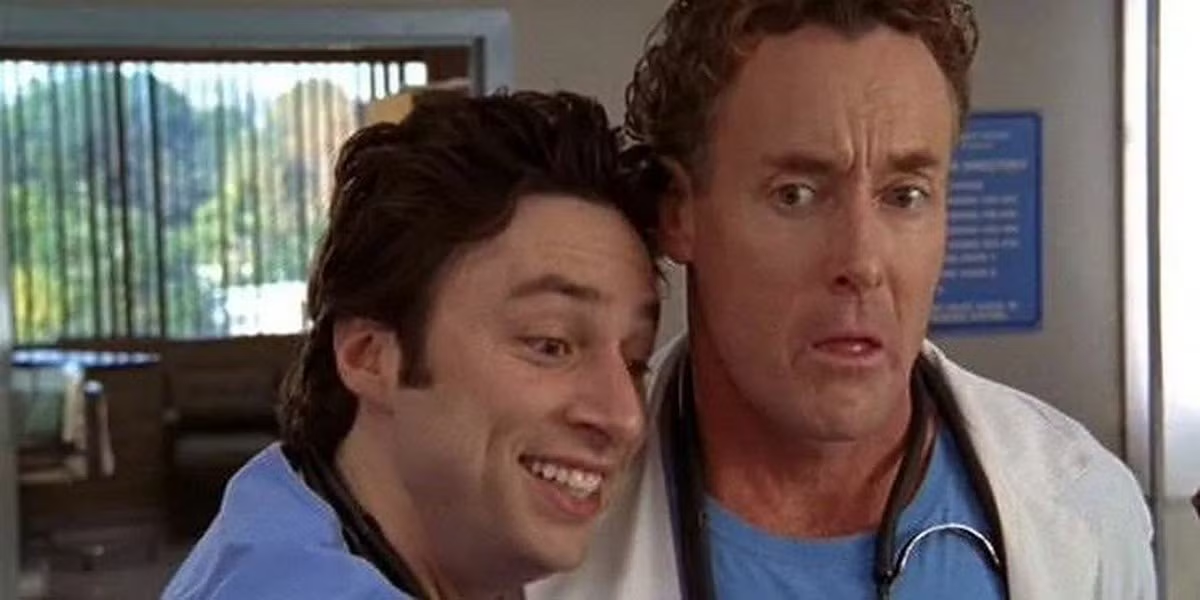
1. Attachment to Dr Cox
One of the most popular aspects of the series is the oddly touching relationship between mentor and mentee: Dr Cox (John C McGinley) and JD. It’s perfectly normal to admire and want to emulate an older colleague. But JD’s admiration of Dr Cox always seemed to go a step further. JD looked to the older doc as not only a mentor but a father figure.
JD explicitly states this throughout the series. Most notably in the finale; when during his much sought after hug JD claims Dr Cox smells “like a father figure”. This is odd as Dr Cox is only about 13 years JD’s senior. We know JD’s biological father (played by the late John Ritter) was pretty much absent during JD’s childhood. Is this yearning for a parental figure a way to fix JD’s damaged childhood?
As loathe as I am to criticise a fan favourite but Dr Cox openly mocks and belittles JD, almost never referring to his protégé by name. Instead by a vast archive of disparaging nicknames. The show does establish that there is love and respect om both sides, from Dr Cox deep down (deep, deep down). But why does JD not only put up with as well as seek out this treatment? Very masochistic. Or, has JD been subconsciously taught that taunts and aggression equate to love?

2. Feels Affinity with Dr Cox and Elliot
The show establishes early on that Dr Cox had an abusive homelife as a child. He openly reminisces about his parents being violent alcoholics. Is this the real reason that JD clamours for Dr Cox’s attention? Does JD see Dr Cox as an inspiration of someone who came from a similar background to his and became a well-respected doctor and family man?
Is the same true of JD’s on/off girlfriend, future wife and fellow doctor; Elliot? The show establishes that Elliot’s parents are mentally, emotionally, and financially abusive. Are JD and Elliot drawn to one another (partly) because they are both traumatised by their past? Even when it is proven time and time again that they are not suited.

3. Hostile Relationship with Older Brother
JD’s older brother Dan (Tom Cavanagh) appears several times in the show. Despite regularly visiting his kid brother, JD makes clear that these visits are not welcomed. JD’s ire is uncharacteristic as he’s shown as an ardent people pleaser throughout the show. Yes, Dan did bully JD throughout their childhood, though it’s unclear whether this was normal sibling rivalry or more.
In Series 3 Episode 5 ‘My Brother, Where Art Thou?’ JD attempts to cut off contact with Dan claiming that Dan never looked out for him. Even as children of divorce why is JD so upset his brother didn’t protect or “come through” for him? In the same scene JD comments about how their mother “married anyone that rang the doorbell”. Reading into this (hey, it’s what we’re here for) did Dan not protect JD from these multiple husbands?

4. Audience Never Actually See JD’s Mother
To me this is the most obvious that something is suspicious about the Dorian matriarch. Despite seeing every other cast members mother (except Dr Cox but its implied that his parents are dead) we never see JD’s. He, at the very least, seems to have a good relationship with his mother. Mostly speaks highly of her and she calls often. It doesn’t follow the trope many sitcoms use; having a character the audience never physically sees being used for comedic effect.
We hear JD’s mum (Barbara) speak in a flashback (Series 3 Episode 21 ‘My Self-Examination’). While Barbara was tucking young JD into bed she was saying some quite toxic things to her child, like how no women will ever be good enough for him. It is clear this scene is supposed to be somewhat creepy as Barbara is stroking the child’s face in an inappropriate manner. Adult JD even refers to his mum as “sexy” in the same episode. Very Freudian but in the light of everything else we are discussing: very disturbing!
5. JD’s Mother Drank
Linked to number 4 JD admits in Series 8 Episode 2 ‘My Last Words’ JD admits his mum “drank a lot”. Does this statement answer some questions about JD’s odd childhood?
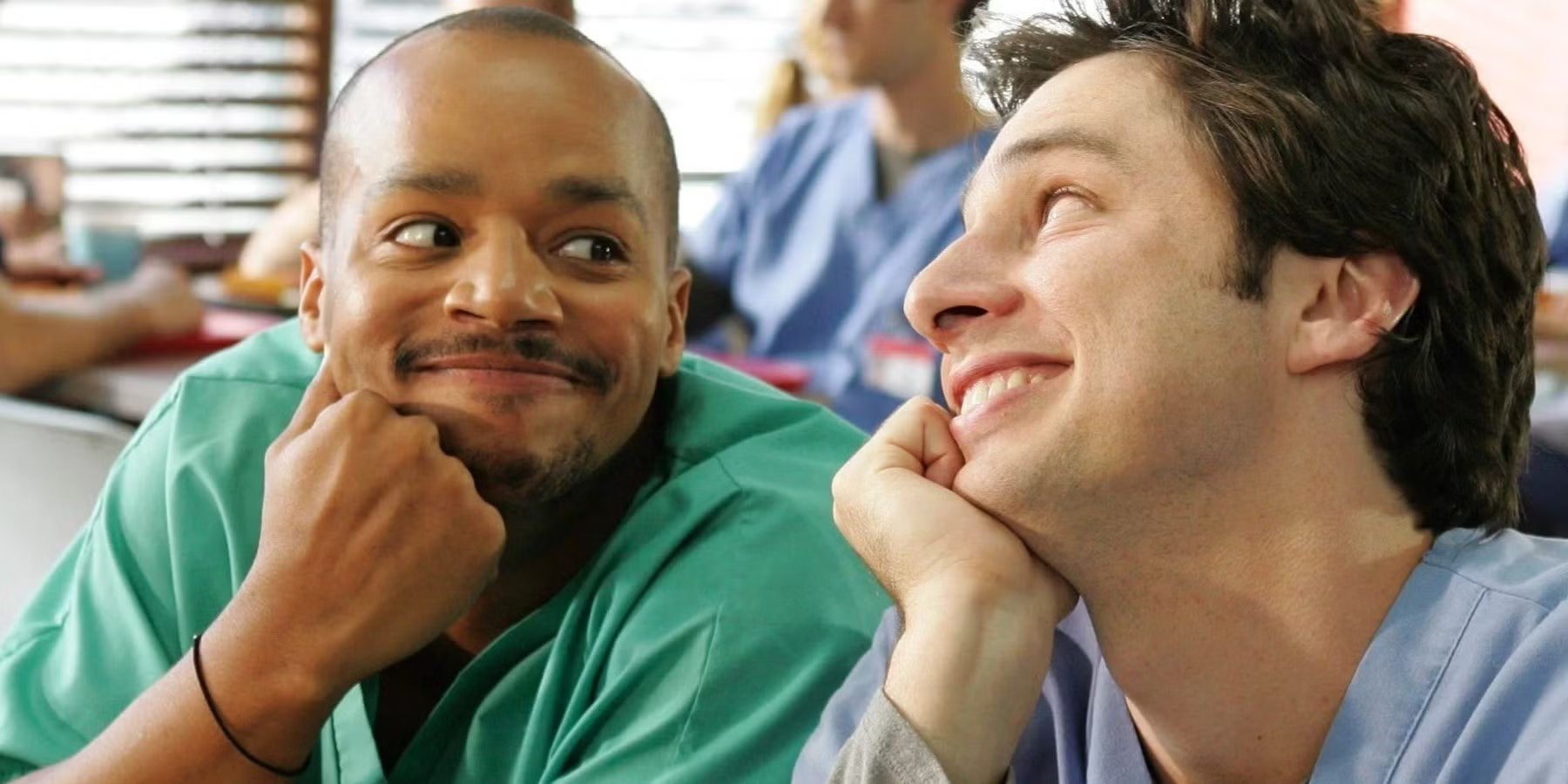
6. JD is a People Pleaser
As we have already mentioned JD is a pathological people pleaser (what’s that like?). As a doctor he goes above and beyond for his patients. He does everything from finding patients estranged family members (Series 4 Episode 11 ‘My Unicorn’) to shaving his head in solidarity with a chemo patient (Series 5 Episode 15 ‘My Extra Mile’). Of course this is all very commendable but JD particularly enjoys the gratitude. Why does he need this validation? Is this a coping mechanism from a turbulent background who had to go above and beyond to get the love that should have been unconditional?
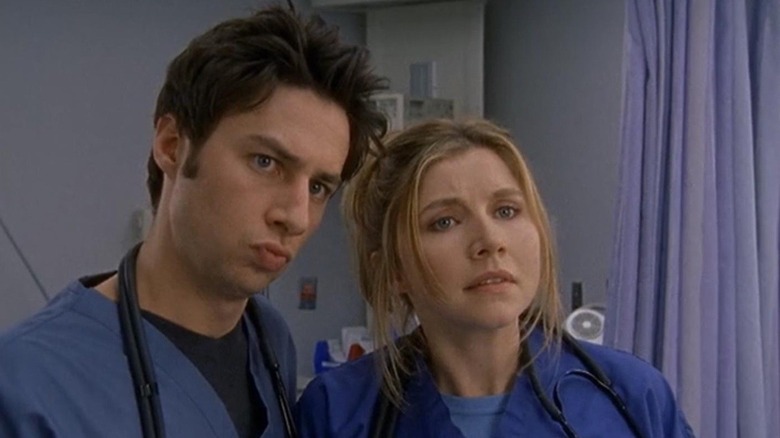
7. Extremely Tactile
Another of JD’s character traits is he extremely tactile. This is of course played up for comedy with his ‘sneak hugs’ (Series 6 Episode 13 ‘My Scrubs’) delivered to the stand-offish Dr Cox or the fact he has his friends on a ‘hugging schedule’ (Series 5 Episode 8 ‘My Big Bird’). Is this someone trying to seek the love and affection he never received in childhood? Or reassure himself that the people he loves won’t disappear?
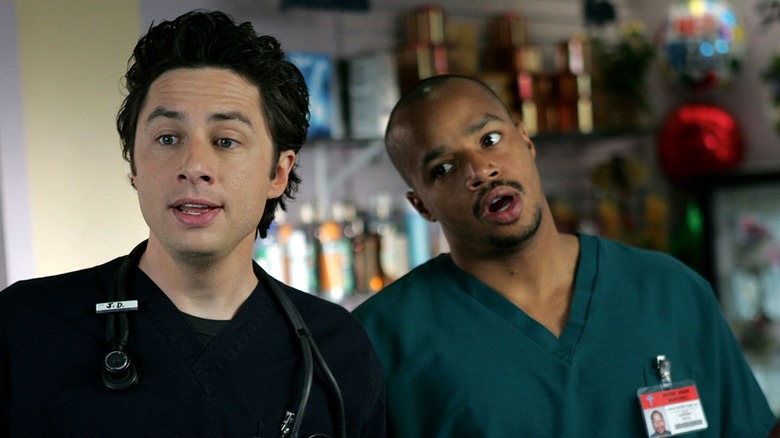
8. Self-Sabotaging
A common reaction to childhood trauma is self-sabotaging behaviour. In his romantic relationships JD has this in spades. Throughout the run of the show JD has more romantic partners than the rest of cast put together. It is acknowledged that JD goes from relationship to relationship with alarming speed and breaks them off for shallow reasons. Again, he may be trying to seek the love and security he never had in childhood.
JD’s damaged psyche is put on full display when after spending the majority of the series chasing Elliot she finally leaves her loving boyfriend for him. JD immediately decides he doesn’t want her anymore to many fans outrage (Series 3 Episode 20 ‘My Fault’).
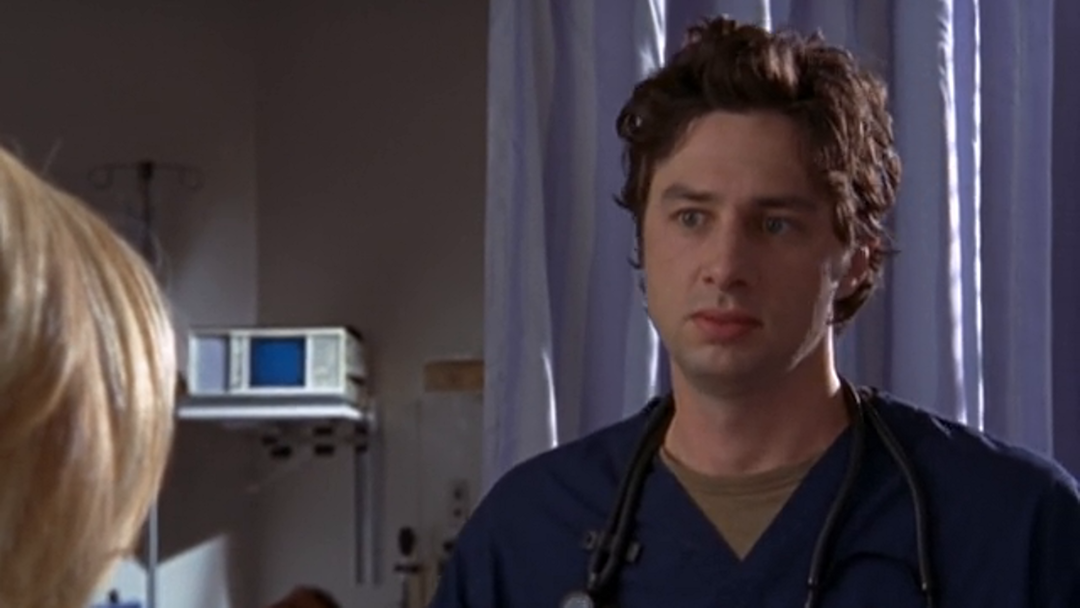
9. No Therapy
As well as never actually seeing his mother, we never see JD engaged in any kind of therapy. All of the other characters attend various types of therapy throughout the series. JD does not, despite arguably needing it the most. Is JD perhaps too scared of what therapy might uncover or not want to deal with his trauma head on?
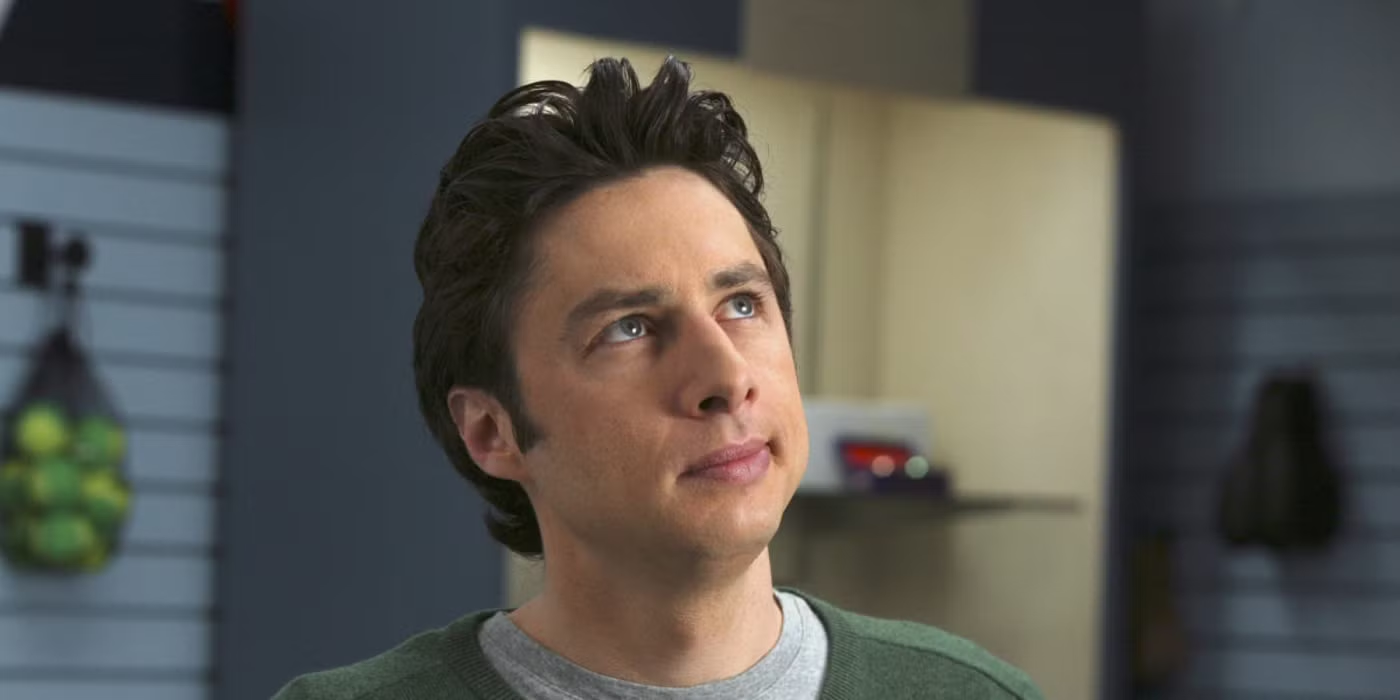
10. Overactive Imagination
During Scrubs entire run (except the final series thou shalt not be named) hinges on JD’s overactive imagination. His outlandish fantasies make for excellent comedy and unique sequiturs to break up the storylines. But what if this was yet another coping mechanism for the hapless leading man?
Children from challenging background often disappear into elaborate fantasy worlds in order to escape their surroundings. Is this a habit JD could never quite kick? It would explain why he doesn’t seem to have a lot of control of his daydreaming despite being an adult. It is a comfort and a way to deal with the difficult stuff life throws at him.
If any or all of these speculations are true Scrubs goes from being a mere half-hour sitcom to a story of one man’s triumph over his dark past. Despite his flaws and failings JD has still made something of himself and is surrounded by his chosen family; all of whom love him for who he is. This is extremely inspiring.
Movie
‘Mufasa: The Lion King’ Will Leave You Breathless

“Mufasa: The Lion King” is a visually stunning addition to the beloved Lion King franchise, offering a fresh and emotionally resonant take on the origins of one of Disney’s most iconic characters. The film beautifully explores Mufasa’s journey, balancing heartfelt moments with touches of comedy that lighten the mood and make the story accessible to audiences of all ages. The animation is breathtaking, capturing the vibrant landscapes and lush environments of the Pride Lands, adding depth to Mufasa’s character and his relationships.
The storytelling is compelling, effectively pulling at the heartstrings while providing insights into Mufasa’s character before he becomes the legendary king. However, the setup for Scar’s betrayal feels somewhat underdeveloped, lacking the deeper motivation that could have enriched their complex brotherly relationship. This missed opportunity leaves a slight gap in understanding Scar’s actions, which could have elevated the dramatic stakes.
The musical score is impressive, featuring memorable songs that enhance the emotional impact of pivotal scenes. While there are several standout tracks, one song, in particular, resonates deeply and is sure to linger in viewers’ minds long after the credits roll. Overall, “Mufasa: The Lion King” is an amazing film and a worthy addition to the Lion King lore that manages to deliver both laughter and tears, offering a rich tapestry of storytelling that fans will appreciate.
Movie
Is ‘Kraven the Hunter’ a Total Letdown?

“Kraven the Hunter,” directed by J.C. Chandor, aims to introduce a beloved Spider-Man villain to the big screen, but unfortunately, it falls short of expectations. The film suffers from noticeable issues, notably an overuse of ADR (Automated Dialogue Replacement), which detracts from the authenticity of the characters’ interactions and contributes to an uneven audio experience. This technical flaw is compounded by rough storytelling that feels disjointed and lacking in coherence, leaving viewers struggling to connect with the narrative.
Aaron Taylor-Johnson delivers a commendable performance as Kraven, showcasing the character’s gritty nature and complex motivations. His portrayal has potential, and it’s evident that he could elevate the character far beyond what is presented with a stronger script and direction. However, the absence of Spider-Man, a central figure in Kraven’s lore, leaves a void that the film struggles to fill. Without this critical connection, the plot meanders and fails to create the tension or stakes that fans of the superhero genre crave.
Additionally, including Rhino as a villain feels like a missed opportunity; he is presented more as a gag character with limited screen time, undermining any sense of threat or depth. For the average moviegoer, “Kraven the Hunter” might entertain but ultimately feels like a mediocre viewing experience. Comic book fans, however, may find disappointment in this lackluster attempt to create a solo character film. Instead of an exhilarating dive into Kraven’s world, the film presents a watered-down version, leaving audiences wishing for a more cohesive vision that honors its comic book roots.

